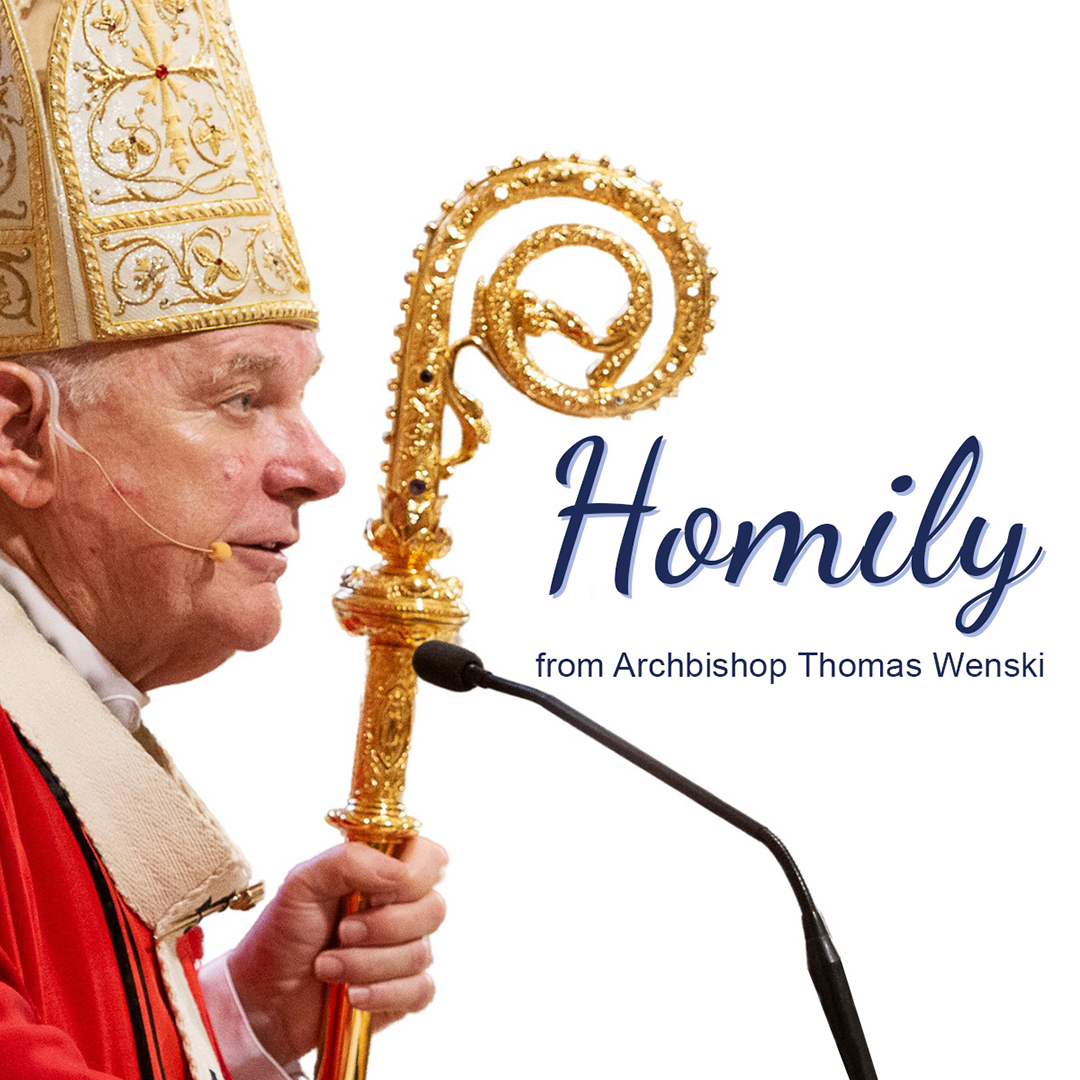By Archbishop Thomas Wenski - The Archdiocese of Miami
Archbishop Thomas Wenski preached this homily at the ordination Mass for Father Jorge Reyes and Father Jakub Bereza, celebrated May 10, 2025, at St. Mary Cathedral in Miami.
Earlier this week, as the Cardinals entered the Sistine Chapel, they prayed and sang the “Litany of the Saints,” seeking the intercession of the Holy Spirit would give us a new Pope “according to God’s heart for the good of the Church and of humanity”. We did not have to wait long for those prayers to be answered. Habemus Papam! Pope Leo XIV!
At a time, when it seems the world does not think that it even needs the Church, the fact that not only Catholics but the entire world awaited anxiously to see “white smoke: billow over the roof of the Sistine Chapel shows that the world does need the Church and that it expects much from the Church and her shepherds. For the good of the Church and of humanity, we needed a Pope. And we need, the Church needs, the world needs priests “according to God’s heart” as well. Shortly, we too will invoke the intercession of the saints as we pray for these two men. “Pastores dabo vobis,” God promised his people. I will give you shepherds. Today, by the imposition of hands, this local Church is gifted with two new shepherds.
As Jesus’ heart was moved with pity for the troubled and the abandoned, those who seem like sheep without a shepherd, so too should a priest’s heart be moved. Pastoral charity and not the desire for fame or fortune, should motivate the priest in his ministry. When Jesus first sent out his apostles, he told them: “Proclaim the Kingdom of God: Cure the sick, raise the dead, cleanse lepers, drive out demons.” Quite a job description for them and for you, Jorge and Jakub, and for each one of us who has answered Jesus’ call to “follow” him in the ministerial priesthood.
A priest is to “cure the sick”; that is, to attend to the ill and the injured, healing their isolation with a visit and bringing courage to those who are weak. A priest is to raise the dead, that is, to restore hope to those deadened by discouragement and defeat. A priest is to cleanse lepers, that is to befriend the outsider, to extend the hand of friendship to the marginalized and rejected. A priest is to drive out demons by helping people deal with the various addictions that affect them and by not failing to address any personal demons that may threaten the integrity of his commitment.
Our world is characterized by great technological progress but tends to forget God. Caught up in the immediacy of the “here and now”, the world has closed itself to the transcendent and thus to a future of hope, that hope that we celebrate in the Sacramental life of the Church.
So that the world does not forget God, you, Jakub and Jorge, will gather the faithful and do what the Lord commanded when he told the apostles at the Last Supper: “Do this in memory of me.”
The world needs – desperately needs – your priestly witness. But the witness of your priestly ministry will be made more compelling by your detachment from material comforts and signs of status, by your readiness to obediently be available wherever your bishop may send you, and by your chaste celibacy which is the source of spiritual fecundity.
Celibacy, to be sure, is not easy; but then again, neither is Christian marriage, for both require the gift of oneself in imitation of Christ’s own gift of himself on the Cross.
As priests, you will forgive sins in the name of Christ and the Church in the sacrament of penance. Be generous with your time, making this sacrament available to your people. And do not neglect to avail yourselves of its consolations. For the demands of the ministry with its inevitable trials and disappointments, and the fact that we carry the “treasure” of the Gospel in “earthen vessels”, can sometimes tempt us priests to give into discouragement and, perhaps, sometimes even to try the patience of our people. But frequent confession will not only keep you humbly aware of your own unworthiness but will also constantly remind you of the primacy of grace: God uses imperfect instruments to work his will so that we know that it is He who saves and not we. And the Mercy of God will always be greater than our own weakness and unworthiness.
In his homily yesterday at a Mass celebrated with the College of Cardinals, Pope Leo referred to Ignatius of Antioch, who was led to Rome in chains. Before he was executed, he wrote to Christians of Rome. “Then I will truly be a disciple of Jesus Christ, when the world no longer sees my body” (Letter to the Romans, IV, 1).
Pope Leo explained: “Ignatius was speaking about being devoured by wild beasts in the arena – and so it happened – but his words apply more generally to an indispensable commitment for all those in the Church who exercise a ministry of authority. It is to move aside so that Christ may remain, to make oneself small so that he may be known and glorified (cf. Jn 3:30), to spend oneself to the utmost so that all may have the opportunity to know and love him.”
And so, with these two men, we make our own the words of Simon Peter to Jesus (as heard in today’s Gospel) “Master, to whom shall we go? You have the words of eternal life. We have come to believe and are convinced that you are the Holy One of God.”
And we commend them to the prayers and protection of Mary, Mother of the Church and Queen of the Apostles.

